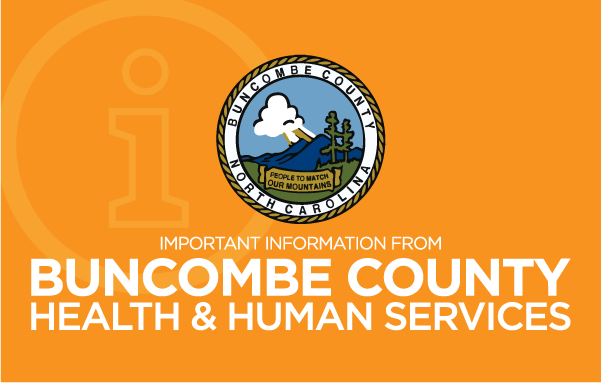This news item expired on Monday, September 24, 2018 so the information below could be outdated or incorrect.

Flooding and standing water can expose the public to infectious diseases, chemical hazards and injuries both during and after a weather event. Buncombe County Health and Human Services wants residents and businesses to be aware of steps that we can all take to reduce injury and illness due to flooding. Proper assessment of wells and septic systems, as well as cleaning and moisture removal, remain key to eliminating threats to the public’s health.
Water Supply and Septic Systems:
Flood water can contaminate and damage water and septic systems. Bacteria, viruses, or other pathogenic organisms are often present in surface water and can pose a threat to the health of the public if consumed. If well and septic systems are compromised, residents and businesses must ensure that these system are safe prior to use for any purpose.
If there is a disruption of utilities during a weather-related event, food service establishments are required to contact Buncombe County Environmental Health at (828) 250-5016. If you experience a loss of power, loss of water, loss of water pressure, and/or flooding, your establishment will require an inspection prior to resuming food preparation.
Citizens who use well water need to take precautions as flood water can contaminate private wells and septic systems. If the well head was covered by flood waters, it should be tested by public health officials, even if the pump still works. While the water may look and smell safe, call Buncombe County Environmental Health at (828) 250-5016 to be sure.
Citizens who use a municipal water supply should contact their water provider for details regarding any boil water advisories. We also encourage residents to follow local news media for updates and advisories.
After a flood, the safe disposal of septic wastewater is essential in protecting human health. It is important to keep children and pets away from sewage or wastewater affected areas.
Signs indicating that your septic system is in distress:
• Drains in the house will flow slowly
• Toilets drain slowly or sound strange when flushed
• Water may back up into floor drains in the basement
Do not use or flush your toilet, take a shower, use sinks, wash clothing or put any water down any drain until you know that the septic tank and associated sewer pipes are intact. Have the septic system professionally inspected and serviced.
Cleaning and Mold:
Flood cleanup involves cleaners, disinfectants, and pesticides. Mixing household cleaners and disinfectants, such as bleach and ammonia, can produce dangerous, toxic fumes. If you are using these cleaning agents, be sure to open windows and reduce your exposure as much as possible while allowing for plenty of time to air out the room. If it's safe to use electricity, use fans to keep the air circulating.
Mold after a flood can cause serious problems and quick action must be taken to control moisture. If you have a mold problem at home, wash it off hard surfaces with detergent and water, and dry completely. Be sure to get rid of the excess water or moisture and fix leaky plumbing or other sources of water.
Other steps to protect yourself and others include practicing good hygiene after contact with flood waters. Wash your hands often. Do not allow children to play in flood water areas or with toys that have been contaminated by flood water and have not yet been disinfected.
If you have questions or need to schedule an inspection, please contact the Buncombe County Environmental Health Department at (828) 250-5016 or visit our office located at 30 Valley Street, Asheville NC 28801. You can also send us an email at: EHRequest@buncombecounty.org.